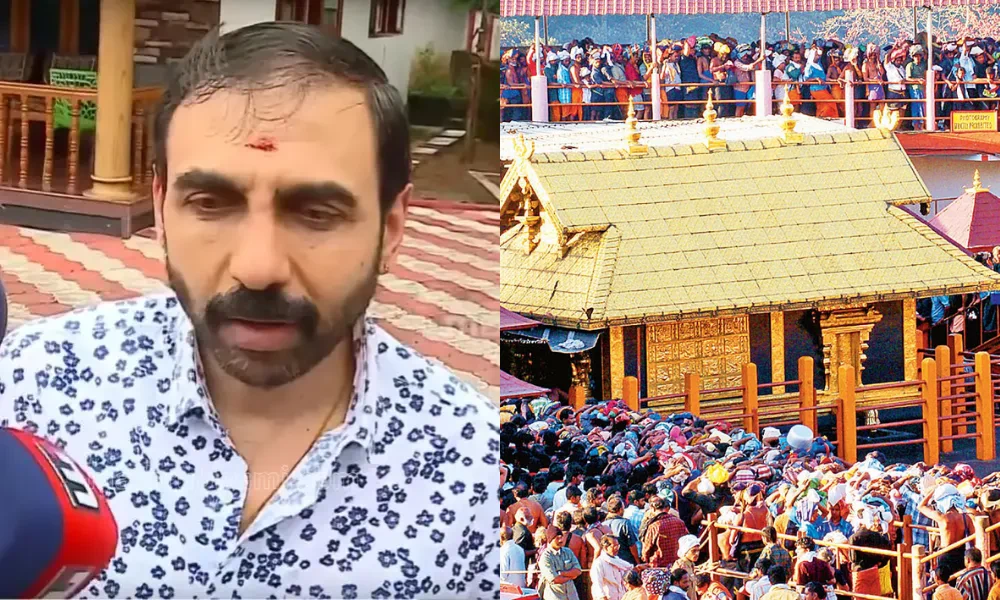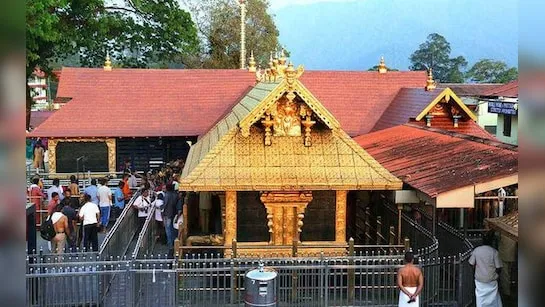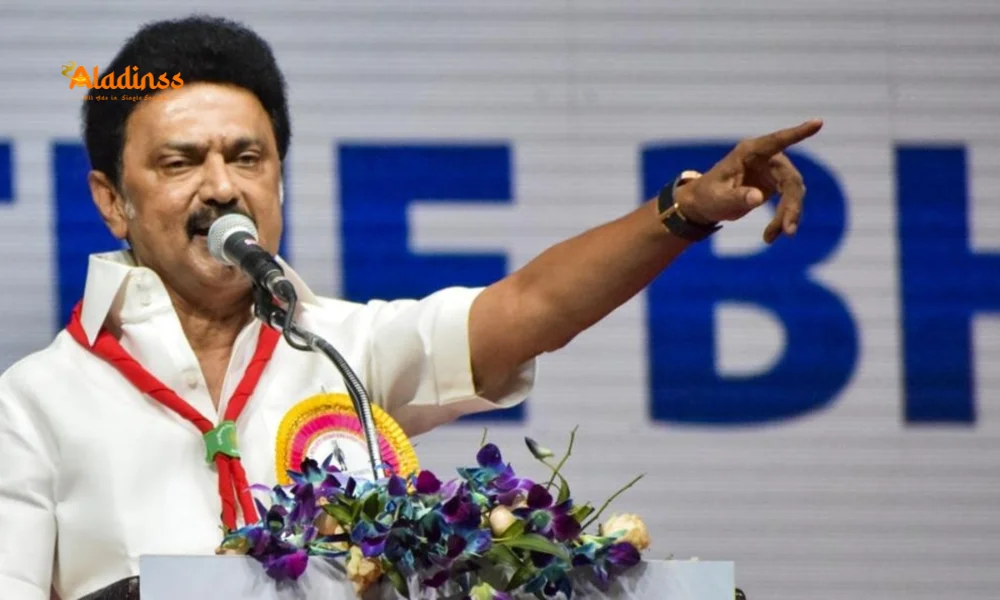Sabarimala Gold Missing: SIT Arrests Potty

Sabarimala Gold Missing Scandal: SIT Nabs Prime Accused Unnikrishnan Potty in High-Stakes Arrest

In a major breakthrough in the long-festering Sabarimala gold missing case, the Special Investigation Team (SIT) has apprehended Bengaluru-based businessman Unnikrishnan Potty, identified as the prime suspect in the alleged pilferage of precious metals from Kerala's iconic hill shrine. The arrest, formalized on October 17, 2025, follows intense interrogation sessions, marking a pivotal moment in the probe ordered by the Kerala High Court. Potty, who was detained from his Pulimath residence near Thiruvananthapuram on Thursday, now faces scrutiny over the disappearance of gold from the temple's revered Dwarapalaka idols and Sreekovil door frames during a 2019 electroplating process.
Police sources revealed that Potty underwent rigorous questioning at the Crime Branch headquarters in the state capital before his official custody was recorded. Post-arrest formalities included a mandatory medical check-up at a government hospital, after which the SIT planned to transport him to Pathanamthitta district for further proceedings. He is slated for production before the Ranni court later today, with the team seeking extended remand to unravel the intricate web of alleged complicity involving Travancore Devaswom Board (TDB) officials.
This development intensifies the spotlight on the Sabarimala gold missing scandal, a controversy that has eroded devotee trust and sparked statewide outrage since its surfacing in 2023. The SIT's mandate encompasses two primary FIRs: one probing the missing gold ornaments from the guardian deity idols and another concerning the pilfered metal from the sanctum's ornate door frames, both handed over to Potty's firm for gilding four years prior.
From Custody to Court: Unnikrishnan Potty's Arrest Unfolds
The sequence of events leading to Potty's arrest underscores the SIT's methodical approach in the Sabarimala gold missing case. Detained late Thursday from his family home in Pulimath-a quiet suburb on the outskirts of Thiruvananthapuram-Potty was promptly ferried to the Crime Branch for overnight grilling. Investigators grilled him on the logistics of the 2019 electroplating assignment, where TDB entrusted gold-clad copper plates of the Dwarapalaka idols and Sreekovil frames to his Bengaluru-based enterprise.
By Friday morning, the interrogation yielded sufficient grounds for formal arrest, with the SIT invoking sections of the Indian Penal Code related to criminal breach of trust and cheating. A routine medical evaluation at the government medical college hospital confirmed his fitness for custody, paving the way for transfer to Pathanamthitta-the administrative hub overseeing Sabarimala affairs. The team anticipates seeking 10-15 days of police custody to extract details on the gold's alleged diversion, estimated at several kilograms worth crores.
Potty's production before the Principal Magistrate Court in Ranni is expected by evening, where the SIT will argue for remand based on preliminary evidence, including discrepancies in weight certificates and witness testimonies from TDB staff.
Unraveling the 2019 Electroplating Fiasco at Sabarimala
The Sabarimala gold missing scandal traces its origins to October 2019, when the TDB initiated a refurbishment drive ahead of the pilgrimage season. In a bid to enhance the sheen of the temple's sacred artifacts, officials dispatched the Dwarapalaka idols' gold overlays and Sreekovil door embellishments to Potty's facility for electroplating-a process meant to reinforce the metal without removal. However, post-return audits in 2023 revealed stark shortfalls: the idols' gold layer had thinned inexplicably, and door frames weighed 20% less than documented.
Initial probes by the TDB Vigilance Wing, which quizzed Potty over two days in 2023, uncovered lapses in oversight: no independent verification of gold quantities before transit, and vague contracts lacking penalty clauses for discrepancies. Potty, a seasoned artisan with prior temple commissions, maintained the losses stemmed from "natural wear," but forensic metallurgical tests contradicted this, detecting tampering traces.
- Dwarapalaka idols: Original gold estimated at 2.5 kg; shortfall of 800 grams detected.
- Sreekovil door frames: 1.2 kg gold overlay; 300 grams unaccounted for post-process.
- TDB lapses: No GPS-tracked transport or third-party audits during the assignment.
The Kerala High Court's intervention in July 2025, directing the SIT formation, stemmed from a public interest litigation by devotee groups decrying the TDB's inaction. Justice Beena Pillai's bench mandated a six-week timeline, expiring November 28, 2025, pressuring the team to expedite findings.
TDB Under Scrutiny: Alleged Complicity of Officials in Gold Handover
Beyond Potty, the SIT's lens is firmly on TDB's inner circle, probing how gold assets were relinquished without stringent safeguards. Key figures under the microscope include the then-deputy commissioner and vigilance officer, accused of bypassing tender norms to award the contract to Potty's firm at undervalued rates. Intercepted communications suggest hurried approvals, possibly to meet the Mandala season deadline, raising red flags on procedural integrity.
The board's preliminary inquiry, which recorded Potty's statement, flagged conflicts of interest: a junior engineer with familial ties to the contractor allegedly fast-tracked clearances. This nexus, if proven, could implicate higher echelons, eroding the TDB's credibility as steward of Sabarimala's 18.5 tonnes of gold reserves. Devotees, who contribute crores annually via hundi offerings, view the lapse as a betrayal of sacred trust.
The SIT has summoned eight TDB personnel for polygraph tests next week, alongside forensic audits of Potty's workshop ledgers. Parallel inquiries into similar refurbishments at other Kerala temples may broaden the scope, unearthing systemic vulnerabilities.
Broader Ramifications: Faith, Finance, and Future Safeguards at Sabarimala
The Sabarimala gold missing case transcends mere theft; it's a litmus test for Kerala's temple governance amid rising pilgrim footfalls-over 40 lakh in 2024 alone. The scandal has dented the shrine's aura, prompting calls for digitized inventory systems and blockchain-tracked asset movements. TDB president PR Krishna Kumar has vowed reforms, including mandatory third-party valuations for all gilding projects.
Financially, the shortfall-pegged at ₹25 crore-strains the board's coffers, reliant on devotee donations and state grants. Legal experts anticipate charges under the Prevention of Corruption Act if official collusion is substantiated, potentially leading to dismissals and asset freezes.
As the six-week probe deadline looms, the SIT's revelations could catalyze statewide audits of devaswom boards, restoring sanctity to these ancient custodians of faith.
Historical Echoes: Past Controversies at Kerala's Holiest Shrine
Sabarimala's chequered history with gold controversies dates to the 1990s, when a 1996 audit unearthed discrepancies in hundi collections, leading to TDB overhauls. The 2011 treasury raid exposed unaccounted jewels, while 2018's entry row protests overshadowed asset mismanagement claims. This latest Sabarimala gold missing scandal echoes these, amplifying demands for transparent governance.
The shrine's gold, amassed over centuries from royal endowments and pilgrim gifts, symbolizes devotion to Lord Ayyappa. Safeguarding it requires blending tradition with technology-drones for perimeter surveillance and AI for anomaly detection in inventories.
As Potty's custody begins, the faithful await justice, hoping this probe mends the fractures in their spiritual bastion.
Comment / Reply From
No comments yet. Be the first to comment!











